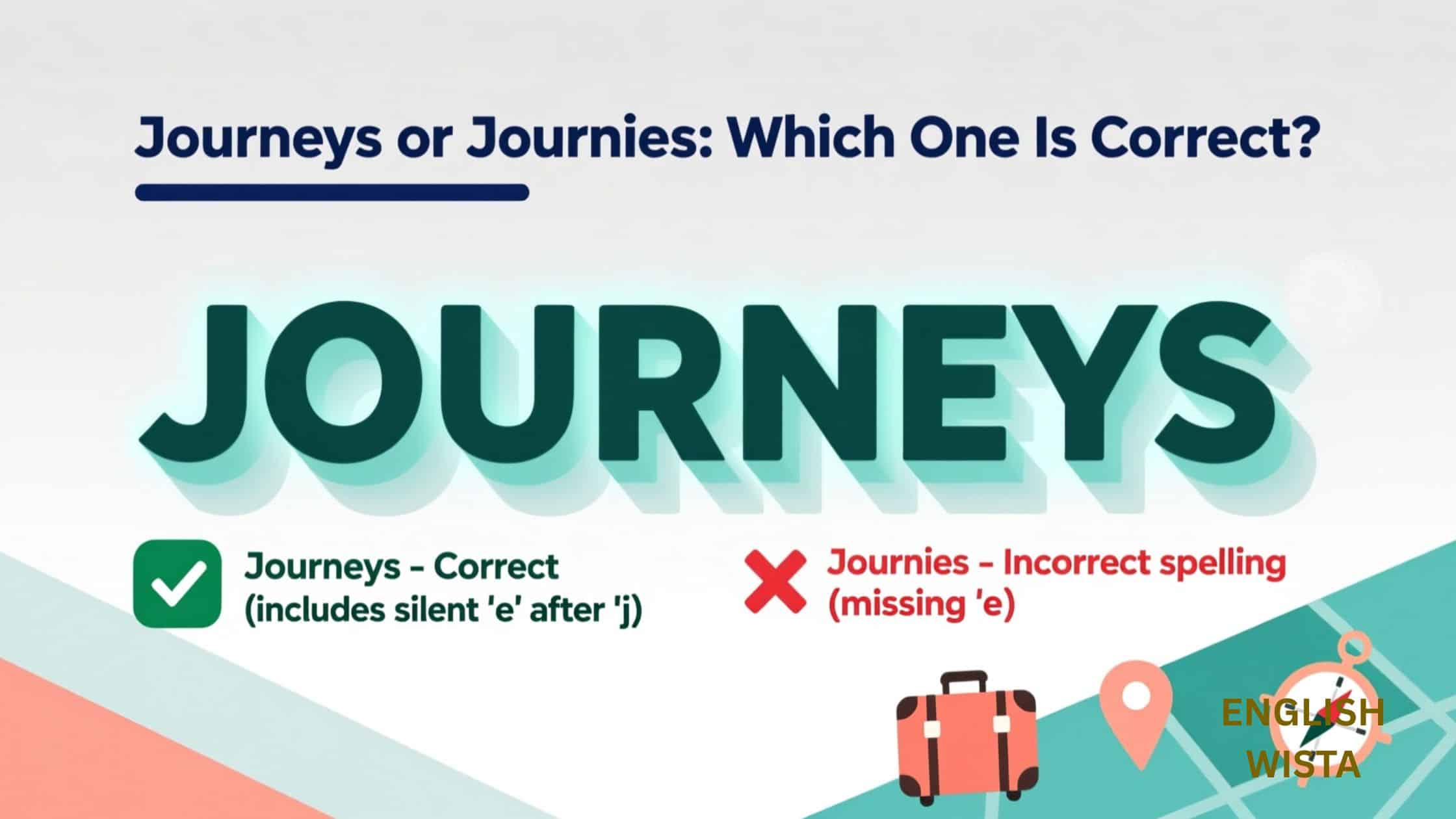Have you ever stopped mid-sentence while writing and wondered, “Wait… is it journeys or journies?” You’re not alone. Many people, including fluent English speakers, get stuck on this tiny spelling detail. After all, English has a long history of irregular spellings, and words ending in -y often trip us up when we make them plural.
The good news? By the end of this article, you’ll know exactly which form to use, why one is correct and the other is not, and how to use it confidently in sentences. We’ll also sprinkle in some fun facts and examples to make it easy to remember.
So, let’s take a closer look at this spelling puzzle and solve it once and for all.
What Does “Journey” Mean?
Before we dive into the plural forms, let’s quickly review what journey means.
A journey is:
- A trip from one place to another.
- A process of traveling, either physically or metaphorically.
- An experience of personal growth or change.
Examples:
- We took a long journey across the desert.
- Learning English is a rewarding journey.
- His journey from a small town to becoming a famous singer inspired many people.
So, whether you’re traveling by train, car, or simply growing through life’s experiences, the word journey captures the idea of moving forward.
What Is the Plural of “Journey”?
Now comes the big question: what happens when you have more than one journey?
The correct plural is journeys, not journies.
Correct:
- We went on many exciting journeys last summer.
Incorrect:
- We went on many exciting journies last summer.
This may look confusing at first, so let’s break down why.
Why “Journeys” and Not “Journies”?
English spelling rules often confuse learners, but once you see the pattern, it becomes clear.
Here’s the rule for most nouns ending in -y:
- If a noun ends in consonant + y, we change the y to i and add -es.
- Example: baby → babies, city → cities.
- If a noun ends in vowel + y, we simply add -s.
- Example: boy → boys, key → keys.
Now look at journey: it ends with -ey, where e is a vowel. That means we only add -s.
So:
- journey → journeys
- not journies
Quick Tip to Remember
Think of the word monkey. Its plural is monkeys, not monkies. Since both monkey and journey end in -ey, they follow the same rule.
Is “Journies” Ever Correct?
This is a fair question because you may have seen journies floating around online or in old texts. But in modern English, journies is considered incorrect.
It’s simply a common spelling mistake caused by over-applying the y → ies rule. While some old English variations might exist in history, in standard English today, only journeys is correct.
So if you’re writing an essay, email, or story, always use journeys.
Singular vs. Plural: Examples in Context
To make this clearer, let’s look at some examples side by side.
Singular (journey):
- My journey to Paris was unforgettable.
- This book tells the journey of a young hero.
- Meditation can help you on your inner journey.
Plural (journeys):
- Our family took three different journeys last year.
- The documentary follows the journeys of several travelers around the world.
- Language learners often share similar journeys of discovery and challenge.
Notice how the meaning doesn’t change much; we’re just talking about more than one trip or experience.
What Is the Origin of the Word “Journey”?
Sometimes understanding where a word comes from makes it easier to remember.
The word journey comes from the Old French word jornee, which meant “a day’s travel” (from jour, meaning day). Over time, the meaning expanded to any kind of travel, not just what you could do in one day.
So, next time you see the word, picture travelers in medieval Europe measuring their trips in “day-long” journeys. It’s a nice mental image to connect with the spelling.
Other Words Similar to “Journey”
Let’s compare with a few words that follow the same pattern:
- Valley → Valleys (not vallies)
- Turkey → Turkeys (not turkies)
- Donkey → Donkeys (not donkies)
In all these cases, the vowel before the y means we only add -s. That’s the same logic behind journeys.
Common Mistakes Learners Make
Here are some frequent slip-ups to watch out for:
- Writing journies instead of journeys.
- Fix: Remember the vowel before the y keeps it as journeys.
- Thinking journeys is not a real word.
- Fix: Journeys is absolutely correct and standard.
- Mixing journey with trip or travel.
- Fix: A trip is usually shorter and more specific. Travel is the activity in general. Journey often feels deeper, longer, or more meaningful.
Examples:
- Our weekend trip to the beach was relaxing.
- She loves to travel around the world.
- His journey of healing took several years.
Can “Journey” Be Used Figuratively?
Yes! While journey often means physical travel, it’s also widely used in a metaphorical sense.
Examples:
- Her journey to self-confidence was long but worth it.
- The team’s journey to victory inspired the whole town.
- Life is a journey, not a race.
This figurative use is very common in English and makes the word especially powerful in writing and conversation.
Fun Facts About “Journey”
Here are a few extra tidbits to make the topic more memorable:
- The popular rock band Journey took its name from the word. Their songs often talk about love, dreams, and, of course, life’s journeys.
- The word “odyssey” is another term similar to journey, but it comes from Homer’s ancient epic about Odysseus’s long travels.
- In literature, a “hero’s journey” is a classic storytelling pattern used in books and movies. Think of Harry Potter, The Lion King, or Star Wars all heroes go on journeys of discovery and transformation.
Quick Recap of the Key Points
- Journey means a trip, travel, or life experience.
- The plural is journeys, not journies.
- Rule: words ending in vowel + y simply take -s.
- Examples: journey → journeys, monkey → monkeys, valley → valleys.
- Figurative meaning: journeys can describe personal growth, not just travel.
Conclusion
So, which is correct: journeys or journies? The answer is clear journeys is the right form.
If you ever feel uncertain, just remember the simple rule: when a word ends with vowel + y, like journey, monkey, or turkey, you only add -s. That way, you’ll never fall into the journies trap again.
Life itself is full of journeys some short, some long, some exciting, and some challenging. But no matter what kind of journey you’re on, at least now you’ll know how to spell it correctly.
The takeaway? Write journeys with confidence, and leave journies behind. After all, mastering little details like this makes your own journey with English smoother and more rewarding.



